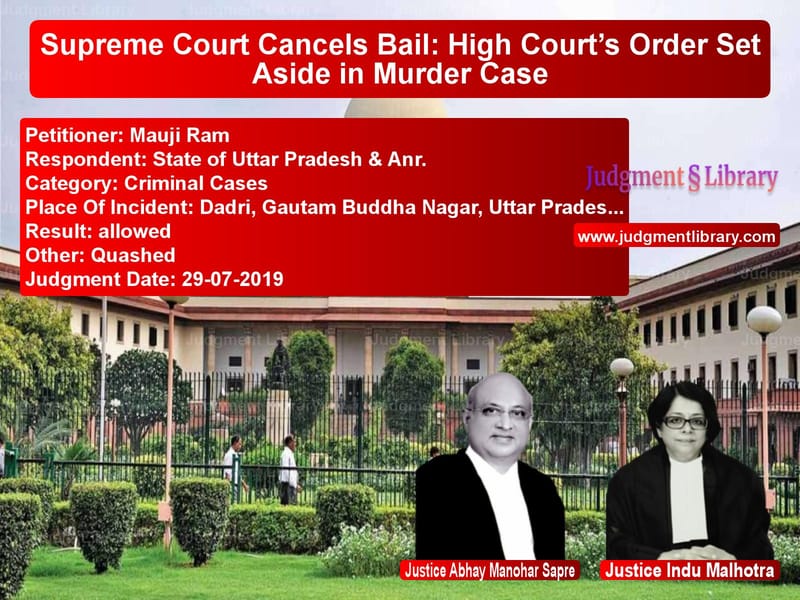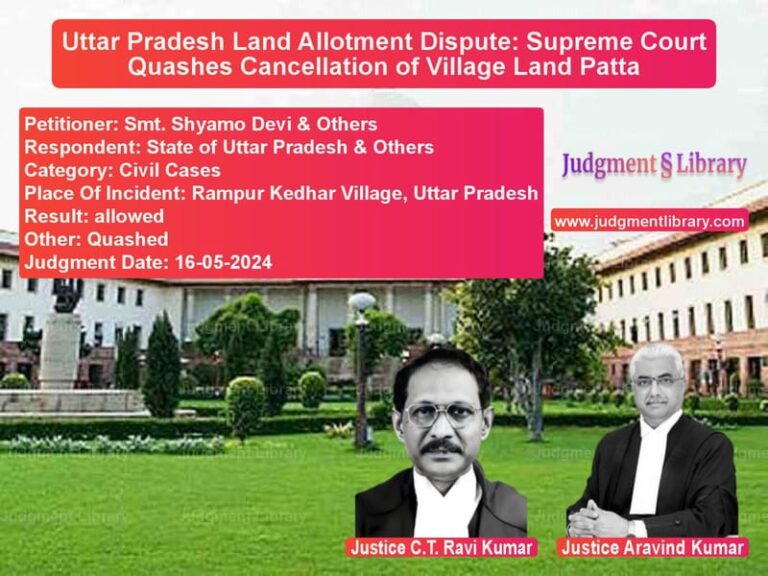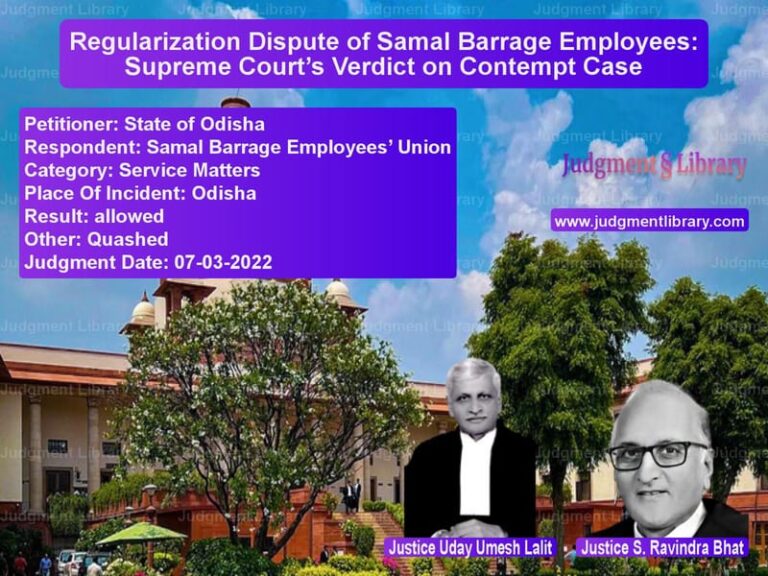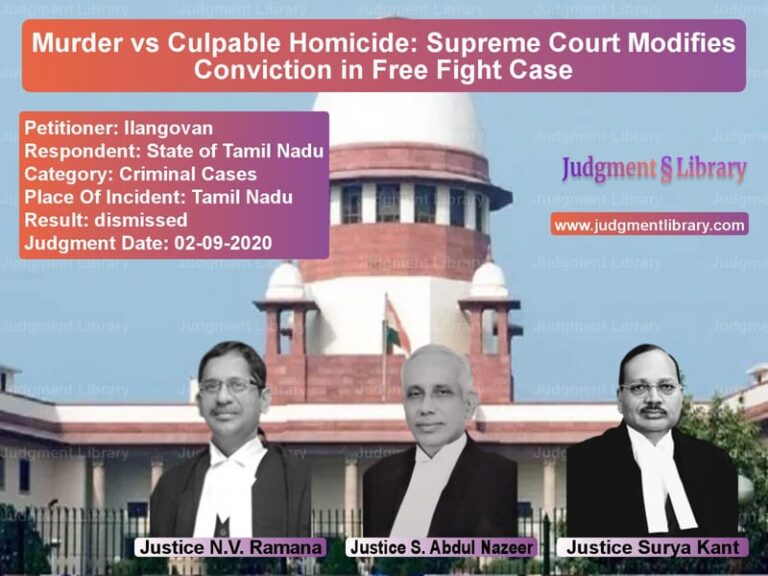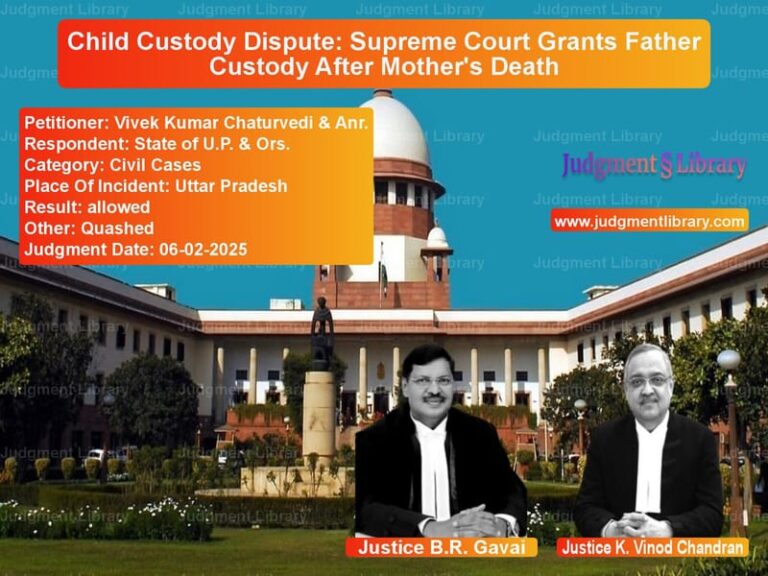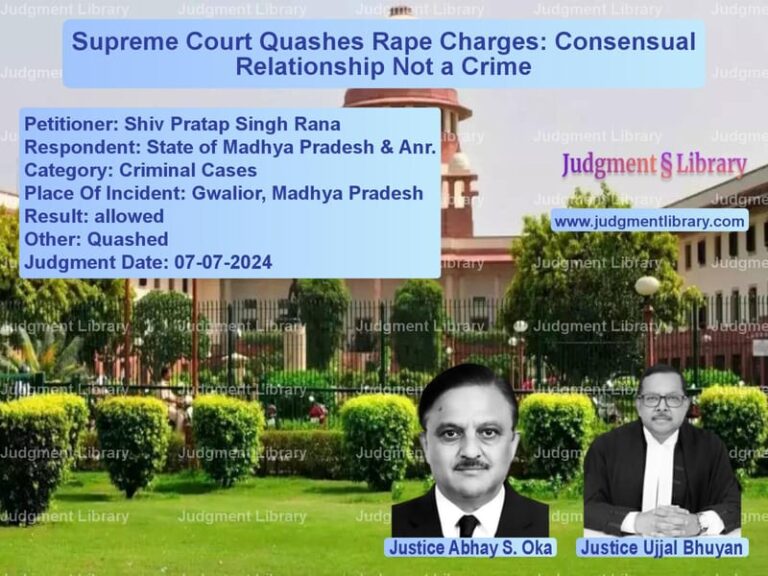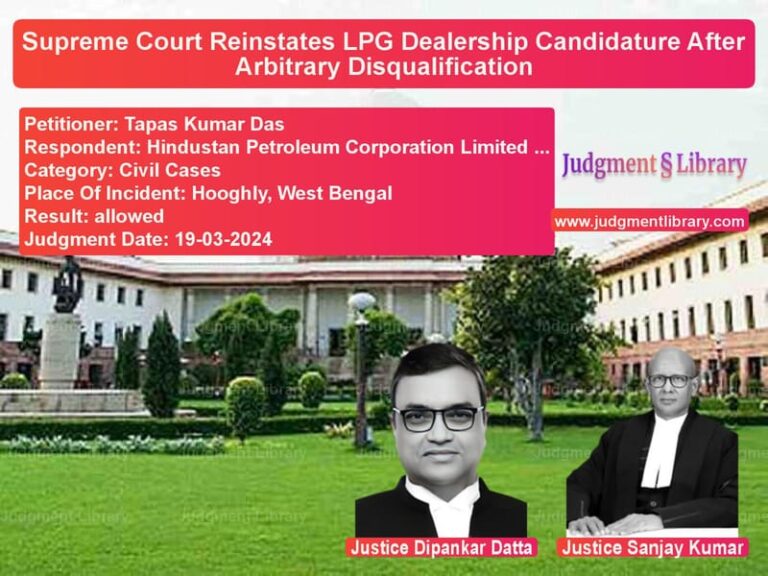Supreme Court Cancels Bail: High Court’s Order Set Aside in Murder Case
The case of Mauji Ram vs. State of Uttar Pradesh & Anr. is a crucial ruling concerning bail in serious criminal offenses. The Supreme Court set aside the Allahabad High Court’s order granting bail to the accused in a murder case, emphasizing that the High Court failed to provide adequate reasons for its decision.
The accused were facing trial under multiple sections of the Indian Penal Code (IPC), including Sections 302 (murder), 307 (attempt to murder), and 120B (criminal conspiracy). The Supreme Court found that the High Court did not consider the gravity of the offense and the antecedents of the accused before granting bail. Consequently, the bail was canceled, and the accused were directed to surrender.
Background of the Case
The case arose from a murder incident in Dadri, District Gautam Buddha Nagar, Uttar Pradesh, involving the killing of Sumit Kumar, the son of the complainant, Mauji Ram. The key facts were:
- A First Information Report (FIR) was registered against the accused under Sections 147, 148, 149, 302, 120B, 307, 323, 506, and 427 IPC.
- The accused were arrested and their bail applications were rejected by the Sessions Court.
- The accused then moved to the Allahabad High Court, which granted them bail without assigning detailed reasons.
- The complainant, Mauji Ram, challenged the bail order before the Supreme Court.
Petitioner’s Arguments
The appellant, Mauji Ram, argued that:
- The High Court’s bail order was passed without considering the seriousness of the offense.
- The accused had a criminal background, which the High Court failed to examine.
- The order was passed in a casual manner without analyzing the evidence or the impact on the victim’s family.
- The trial court had rightly rejected bail based on the nature of the allegations.
Respondent’s Arguments
The State of Uttar Pradesh and the accused argued that:
- The High Court had the discretion to grant bail and its decision should not be interfered with.
- The accused had not violated any bail conditions.
- They were willing to cooperate with the trial proceedings.
Supreme Court’s Observations
The Supreme Court, in its judgment delivered by Justices Abhay Manohar Sapre and Indu Malhotra, ruled against the accused, setting aside the High Court’s bail order.
High Court Failed to Provide Reasons
“The High Court committed jurisdictional error in passing the impugned order because while passing the impugned order, the High Court did not assign any reason whatsoever as to on what grounds, even though of a prima facie nature, it considered just and proper to grant bail.”
The Court emphasized that bail orders must contain detailed reasoning, especially in serious offenses.
Need for Reasoned Orders in Bail Applications
“Time and again this Court has emphasized the need for assigning reasons while granting bail.”
The Court cited previous judgments to highlight that a casual approach in granting bail undermines the judicial process.
Seriousness of the Offense and Criminal Antecedents
“Having perused the FIR and keeping in view the antecedents of the accused persons which are brought on record by the State in their counter affidavit, and further keeping in view the manner in which the offense under Section 302 IPC was committed, we are prima facie of the view that this is not a fit case for grant of bail to the accused persons.”
The Court found that the High Court had overlooked the gravity of the crime and the past records of the accused.
Final Ruling and Impact
The Supreme Court ruled:
- The bail order of the High Court was set aside.
- The accused were directed to surrender immediately before the trial court.
- The trial was to proceed without being influenced by the bail cancellation.
Legal Precedents Considered
The Supreme Court referred to key rulings on bail principles, including:
- Ajay Kumar Sharma vs. State of U.P. (2005) 7 SCC 507: Stressed the importance of detailed reasoning in bail orders.
- Lokesh Singh vs. State of U.P. (2008) 16 SCC 753: Held that bail decisions must consider the severity of the offense.
- Dataram Singh vs. State of U.P. (2018) 3 SCC 22: Emphasized that courts should not grant bail arbitrarily.
Implications of the Judgment
This ruling has significant implications for bail jurisprudence in India:
- Bail orders must be well-reasoned and cannot be passed casually.
- Serious offenses like murder require careful consideration before granting bail.
- Past criminal records of accused persons must be analyzed before granting bail.
- Courts must apply their mind and justify their decisions with strong legal reasoning.
Conclusion
The Supreme Court’s decision in Mauji Ram vs. State of Uttar Pradesh & Anr. reinforces the principle that bail in serious offenses cannot be granted casually. By setting aside the High Court’s order, the ruling ensures that lower courts must assign proper reasons when granting bail in cases involving grave offenses. This case serves as an important precedent for strengthening bail jurisprudence in India.
Petitioner Name: Mauji Ram.Respondent Name: State of Uttar Pradesh & Anr..Judgment By: Justice Abhay Manohar Sapre, Justice Indu Malhotra.Place Of Incident: Dadri, Gautam Buddha Nagar, Uttar Pradesh, India.Judgment Date: 29-07-2019.
Don’t miss out on the full details! Download the complete judgment in PDF format below and gain valuable insights instantly!
Download Judgment: Mauji Ram vs State of Uttar Prade Supreme Court of India Judgment Dated 29-07-2019.pdf
Direct Downlaod Judgment: Direct downlaod this Judgment
See all petitions in Murder Cases
See all petitions in Bail and Anticipatory Bail
See all petitions in Judgment by Abhay Manohar Sapre
See all petitions in Judgment by Indu Malhotra
See all petitions in allowed
See all petitions in Quashed
See all petitions in supreme court of India judgments July 2019
See all petitions in 2019 judgments
See all posts in Criminal Cases Category
See all allowed petitions in Criminal Cases Category
See all Dismissed petitions in Criminal Cases Category
See all partially allowed petitions in Criminal Cases Category

